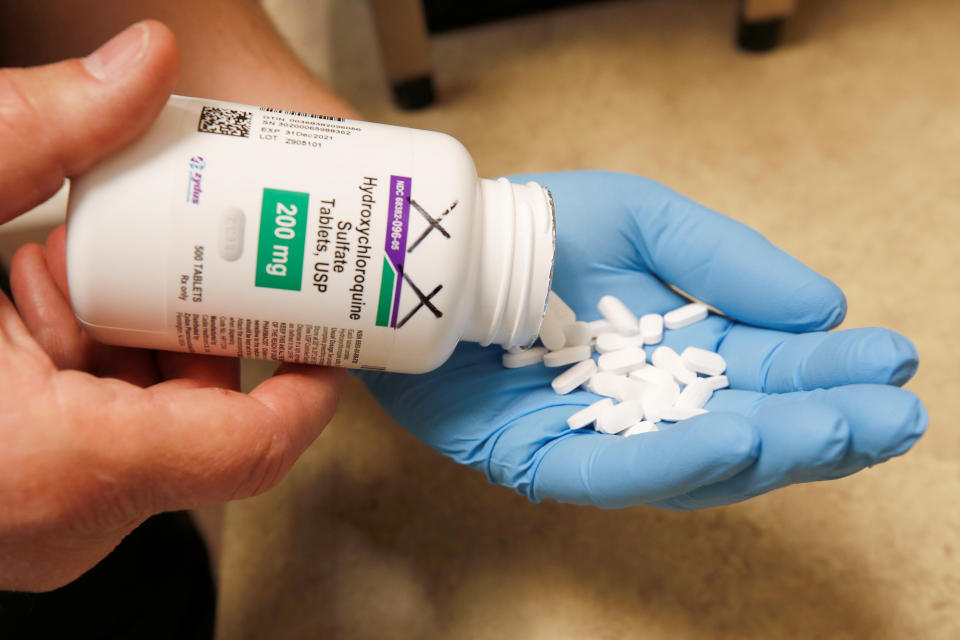Hydroxychloroquine: The drug Trump can't quit
President Trump touted a new study this week that seemed to back up his belief that the antimalarial drug hydroxychloroquine is an effective treatment for COVID-19, the disease caused by the coronavirus that has so far infected at least 2.9 million Americans and killed at least 130,000 here.
The highly respected Henry Ford Health System just reported, based on a large sampling, that HYDROXYCHLOROQUINE cut the death rate in certain sick patients very significantly. The Dems disparaged it for political reasons (me!). Disgraceful. Act now @US_FDA @TuckerCarlson @FoxNews
— Donald J. Trump (@realDonaldTrump) July 7, 2020
Trump, who said in May that he had been taking hydroxychloroquine to ward off potential infection from COVID-19, has frequently championed the drug since the start of the coronavirus pandemic.
“Couple of weeks ago, I started taking it. Because I think it’s good, I hear a lot of good stories. And if it’s not good, I’ll tell you right. I’m not going to get hurt by it,” Trump told White House reporters on May 18.
The study by the Henry Ford Health System in Detroit was published last week in the International Journal of Infectious Diseases. Researchers looked at 2,541 patients hospitalized due to COVID-19 and found that 13 percent of those treated with hydroxychloroquine died from the disease while 26 percent not given the drug died.
Critics note that the Henry Ford trial was not randomized or double-blind, meaning that doctors screened who they gave the medication to, possibly skewing the results. Even Henry Ford CEO Steven Kalkanis conceded that the study is far from definitive.
“It’s important to note that in the right settings, this potentially could be a lifesaver for patients,” Kalkanis said at a press conference last week. “Much more work needs to be done to elucidate what the final treatment plan should be for COVID-19.”

Two days after the Henry Ford study appeared, the World Health Organization discontinued its recommendation for the use of hydroxychloroquine to treat COVID-19 after research as part of the “Solidarity Trial,” an international research effort, showed “little or no reduction” in mortality from the medication.
The U.S. Food and Drug Administration withdrew its emergency approval for hydroxychloroquine as a treatment for COVID-19 on June 15. After reviewing the available research on the drug, the agency said it was “unlikely to be effective in treating” the disease while presenting “serious side effects.”
“It is no longer reasonable to believe that oral formulations of HCQ and CQ may be effective in treating COVID-19, nor is it reasonable to believe that the known and potential benefits of these products outweigh their known and potential risks,” FDA chief scientist Denise Hinton wrote in a letter in which she revoked the emergency use authorization, made after pressure from the president.
The Henry Ford Health System is also conducting a separate, controlled hydroxychloroquine study, the results of which are expected later this month, that will look into whether the drug is effective in the way Trump says he used it, as a prophylaxis against COVID-19.
On Tuesday, White House trade adviser Peter Navarro praised the drug and accused the media of politicizing it.
“It’s the politicization of this medicine by mainstream media and portions of the medical community that have somehow made this a battle between President Trump and them and created this undue fear and hysteria over a drug that’s been used for over 60 years relatively safely and is regularly prescribed to pregnant women if they go into a malaria zone,” Navarro told reporters gathered outside the White House. “The idea that this is a dangerous drug is just silly, but if you ask the American people based on the media’s coverage of it, that’s kind of the state of play right [now].”
Trump’s enthusiasm for the drug began following the release of a limited, non-peer-reviewed study conducted in France on patients hospitalized with COVID-19 that appeared to show that administering hydroxychloroquine in conjunction with the antibiotic azithromycin reduced the length of hospital stays. But subsequent trials showed that the drug offered no benefits to patients and posed potentially serious health risks.
Dr. Anthony Fauci, the leading expert on infectious diseases on the president’s coronavirus task force, has always cast a skeptical eye on hydroxychloroquine.
“The scientific data is really quite evident now about the lack of efficacy for it,” Fauci said in a May 27 interview with CNN, adding that potential cardiovascular problems resulting from its use were significant.
Thanks to the attention the drug received after Trump repeatedly brought it up during briefings of the coronavirus task force, demand for hydroxychloroquine skyrocketed in the U.S. and around the world. The American Medical Association issued a statement on April 17 criticizing doctors who prescribed the drug as an “off-use medication” to treat COVID-19, which is approved as a treatment for malaria and certain autoimmune conditions. By then, however, tens of thousands of prescriptions for hydroxychloroquine had been filled in the U.S.
Carsyn Leigh Davis, a 17-year-old from Fort Myers, Fla., was given the drug by her parents, both of whom work in the medical field, after she contracted COVID-19 following a church function attended by roughly 100 others. Davis had struggled with a variety of health issues throughout her life, and the drug failed to improve her condition. She died on June 23 after being transferred to Nicklaus Children’s Hospital in Miami.
_____
Read more from Yahoo News:



